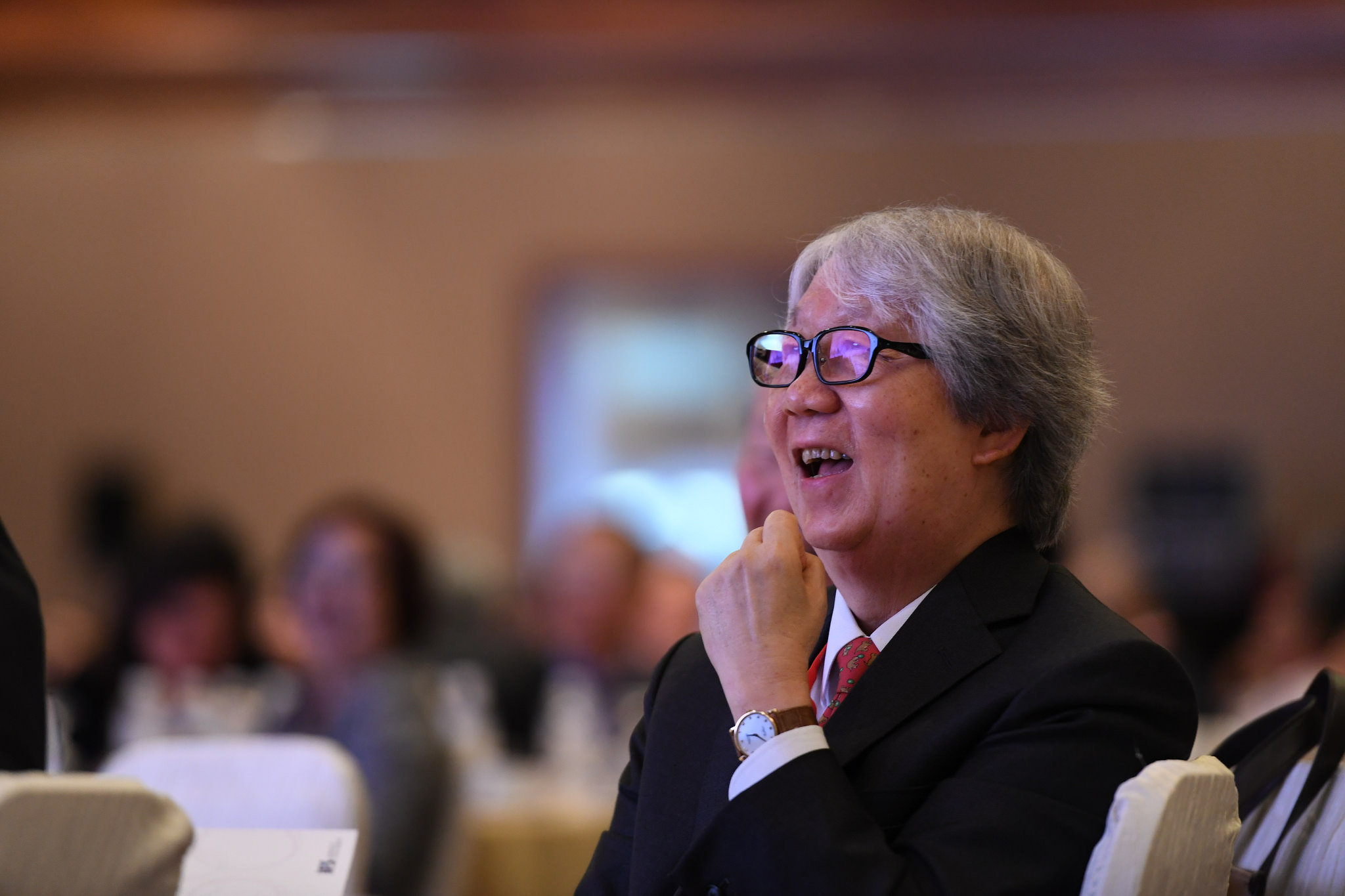At the beginning of each year for the past few years now, the Institute of Policy Studies has held a large-scale conference called Singapore Perspectives, which features scholarly thinkers and public intellectuals sharing their views on particular themes and topics.
Included in this year's edition, themed "What If?", was a trio of young Singaporeans on a panel discussing questions such as "What if non-economic indicators become the measure of a country's progress?" and "What if Singapore fails to become a creative and innovative nation?".
Enter Amanda Chong, a young 27-year-old Harvard-educated lawyer and poet who gave an impressively strident 15-minute speech taking stock of the arts in Singapore over the years, as she explored the topic of "What if Singapore fails to sustain itself as a vibrant, cosmopolitan 'global city'?".
- She started by pointing out that nurturing our creative and cultural sectors "was never a priority in the early stages of our development", quoting the late Lee Kuan Yew who said that "poetry is a luxury we cannot afford".
- She described the development of our arts infrastructure as "a branding exercise grounded in the desire to transform ourselves so we might be attractive to the world", citing our beautiful galleries and museums as well as the government's annual $700 million expenditure on the arts.
"If we continue this trajectory of pursuing a global city built from the outside in while opening our doors wide to the world, we are ultimately closing the doors on ourselves...
Singapore's arts scene is important for our own sake. The arts should not just or even primarily be an instrument of the State to attract global talent."
Here's a summary of the points she made about the importance of promoting an encouraging and nurturing environment for the arts:
1. The arts teaches us to be more mindful of dissenting views that exist, and enrich our understanding of the truth.
"Art can develop that mindfulness, because art — or at least, good art — does not traffic in reductionism. The arts, when unfettered by censorship, can give us the opportunity to engage with all shades of society and alternative views of life. Art can force us out of silos, open up possibilities and challenge us to consider more complex versions of the truth...
In order for art to perform the function of forcing us out of silos, we cannot embrace only art that entertains. We need art that challenges us. Such art forces us to see, hear and think differently and ultimately decide for ourselves if we want to act differently.
Such openness of mind allows us to be poised to listen to each other so we may arrive at a more enriched version of the truth. Surely this is the hallmark of a mature society?"
2. The arts helps us to see other members of our society as equals and as humans, not as objects to be dealt with.
Chong spoke of this particularly in the context of our policymakers, of whom it tends to be said these days to be slightly out of touch with the ground in their decisions and directives.
"The arts also enables us to see people as agents with layered motivations, who make meaningful choices based on their own values and expectations. This sense of empathy can inform the way we think about a myriad of topics including public policy.
As policy makers we become less tempted to think of marginalised groups as objects to be acted upon, problems to be solved, but rather the recognition of agency compels us to focus on building capacity and diminishing vulnerability in individuals. Instead of thinking how we can prescribe values, we focus on how we can empower individual decision-making."
3. The arts can contribute to the national conversation about our future in a meaningful way.
"Conversations about what we value as a nation are now of utmost importance, and so is questioning the course that our country is on. These conversations may take place in conferences like this one, but they can also powerfully take place in the arts.
We must be prepared for a multiplicity of voices to join in this conversation. What is good for our country cannot just be determined by politicians and policymakers. It has to be determined by people too, and the arts can be a valuable means for people to make sense of the discussion and pose their own answers to it...
This is the inherent value of culture — it has always been the job of artists to ask difficult questions and for those in power to listen. They may be uneasy truths that we need to hear or dissenting voices that demand our consideration."
You broke my heart: Tommy Koh
 Photo courtesy of the Institute of Policy Studies, NUS
Photo courtesy of the Institute of Policy Studies, NUS
Enter Ambassador-at-Large Tommy Koh, aged 79, international diplomacy extraordinaire and public intellectual who most importantly was one of the group of pioneering Singaporean "art architects", who laid the foundation for the arts Singapore's arts scene to develop.
Having chaired our first National Arts Council, been second chair on the Singapore Heritage Board and also worked on the team that built the Esplanade and National Gallery, Koh, fresh out of a previous panel session on international geopolitics, stepped up to the microphone to express his sorrow at hearing what Chong had said.
He eloquently also put forward where the government was coming from in building our beautiful museums and shiny theatres:
"I want to say as somebody who was involved in this project, our only ambition is to create new opportunities for Singaporeans. No way would we close the door to ourselves. Our one and only purpose is to benefit Singapore and Singaporeans...
I want to say to you that in the last 25 years I've worked so hard to make the arts blossom in Singapore. And... it was never my intention or those of my colleagues to use the arts as an instrument to attract foreign talent to Singapore. Our ambition was that in addition to economic progress we could build a Singapore in which Singaporeans would be cultured and cultural."
:'(
Chong doesn't buckle
Thankfully, Chong was given the opportunity to respond.
In the light of the emotion and guilt now piled on her, she held her own.
She first stated upfront that her recent anthology of poems, Professions, was part-funded by the NAC, while she herself was a beneficiary of many of their programmes over the years of her development as a poet.
"But where I was coming from in giving these remarks was really... I suppose I was just trying to advance a certain view of how important it is, the imperative to ensure that the arts are created for ourselves. Because even with the best intentions of all these wonderful people... government, organisations (and their efforts for) the arts, I felt I had to represent the voices of what the people in the artistic community do believe to a certain degree.
And to me, I think this dialogue of what the arts community's impressions are, versus what arts administrators' motivations are, is vital for us to move the arts scene forward. And I'm very, very, pleased that Prof Koh stood up and really explained exactly where he was coming from, and his colleagues were coming from... it's something that I do deeply respect and I think that this sort of sentiment has to be in a way communicated to the arts community in a way that they may be convinced by it.
There is a reality that there are members of the arts community who bristle at certain policy decisions and the level of control... but it's all about balance, and I am hopeful that as we develop, this balance will be able to be better and satisfying to the arts community... so I am sorry for (breaking your heart) but I'm coming (from) a place of dialogue and development."
She also responded to a question from a conference participant on the floor about the lack of patriotism in young people and made a point we've all known but never really said:
"I am really, really patriotic. I care a lot about Singapore. One of the reasons (why young people don't seem to be very patriotic is) our version of patriotism is rather narrow. You know, loving our country doesn't mean subscribing to just one particular view of the future of the country or one particular view of the history of the country and where it came from. I think that's what I was arguing when I was giving my speech. In order to forge a direction for Singapore going forward, we need to understand that there are many readings of our development story... and we need to recognise that these come from people who love and want the best for Singapore and for its future."
Nice. Millennials represented.
If you're gonna grow old one day, this article might help:
Caregiver fatigue is real but so are services that let seniors age in place
Also at the IPS conference:
Minister Ong Ye Kung asked at IPS conference: ‘What if S’pore becomes a 2 or multi-party system?’
Top photo courtesy of the Institute of Policy Studies, NUS
If you like what you read, follow us on Facebook and Twitter to get the latest updates.
If you like what you read, follow us on Facebook, Instagram, Twitter and Telegram to get the latest updates.
